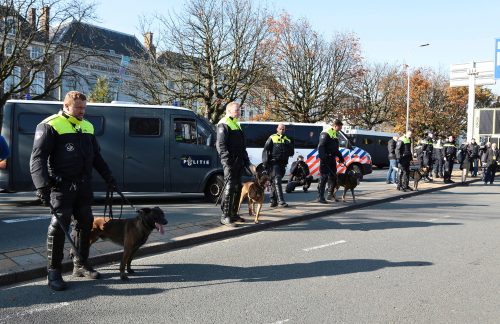
Migrant Riots Strike Holland
The Hague, Netherlands, witnessed a violent clash this past Saturday night. Two groups of migrants with political differences engaged in a riotous confrontation that left Dutch police struggling to maintain order. The groups fighting each other reportedly had political differences over government activities in their home nation of Eritrea.
The rioting took place in and around the Opera Zalencentrum event venue, where an initially peaceful gathering of Eritrean migrants was underway. As the violence broke out and escalated rapidly, rioters broke into the building. Police were called to the scene and decided to use tear gas to restore order. Rioters threw bricks, bottles, and other projectiles at officers. Four police officers were reported injured and the chaos led to extensive property damage.
Watch: Mobs Of Violent African Migrants Riot, Attack Police In Holland https://t.co/zQuLTWxCUQ
— zerohedge (@zerohedge) February 18, 2024
City officials and law enforcement have expressed their dismay and concern over the level of violence. The Hague’s police chief, Mariëlle van Vulpen, described the events as a “very serious violence which erupted out of nothing,” deeming it unacceptable. Similarly, Acting Justice Minister Dilan Yesilgöz and Mayor Jan van Zanen condemned the attacks on emergency service workers and the general disruption caused by the rioters.
🙁🙁🙁
Sad to see that the sacrifices of many have just been thrown away…
👇👇👇#Hague #Riots #Netherlands pic.twitter.com/8VlsBPmiQP
— 'Seeing is believing' (@dave24144975) February 18, 2024
The incident is not isolated but part of a disturbing trend of violence associated with Eritrean events in Europe. Previous riots in Sweden, Canada, the U.S. and London have been linked to the same underlying tensions within the Eritrean diaspora. These events often stem from political disputes between pro-government factions and those opposing the regime back in Eritrea.
The Hague, Netherlands — Clashing African migrant groups rioted and set fires. Eritreans who claim to be refugees in the West have been fighting each other at multiple riots across different cities for months. https://t.co/MKfZn5Y4PO
— Andy Ngô 🏳️🌈 (@MrAndyNgo) February 18, 2024
The recent violence in The Hague raises questions about the effectiveness of multicultural policies in Europe. The incident coincides with growing concerns over the European Union’s new migration pact, which critics have dubbed “the suicide of Europe.” This pact, intended to manage the influx of migrants, is feared to exacerbate tensions and contribute to social unrest, as seen in The Hague and other European cities.
Right-wing leader Geert Wilders, reflecting a segment of Dutch public opinion, took to social media to voice his frustration. He questioned the wisdom of allowing large-scale migration, which he believes leads to internal conflict and strains on public resources and safety. His comments echo a broader debate on how European nations handle the challenges of migration and integration.